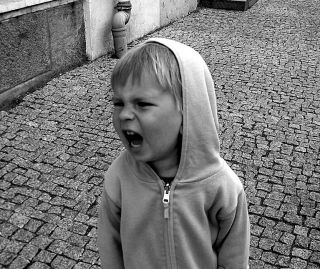Genetics
Relationships Cause Conduct Disorder, Not "Bad Seeds"
No genes or group of genes dictate specific behaviors
Posted July 7, 2015

In response to an article a few years ago in the New York Times entitled Accepting That Good Parents May Plant Bad Seeds, a commenter said that the columnist had made a strong implication that "Children are not dynamic, they can come broken just like computers, without any inherent ability to adapt." Reading the column again, I saw that it implied that the "son" described in the article had apparently come into the world with a heavy genetic loading for rude behavior.
Really? Rudeness is an inherited trait? Those are pretty specific genes, aren't they?
In truth, according to almost all neuroscientists, no gene or combination of genes dictates complex human behavior like that.
The attachment literature clearly shows that the best predictor of how well your relationship with your own children will turn out is the nature of your relationship with your own parents. This happens regardless of whether you remain in continuous contact with your parents, or not. In fact, since you unfortunately carry your parents around in your head forever (regardless of whether either you or they wish it so), "divorcing" your parents may not prevent the intergenerational transmission of highly dysfunctional family patterns. It may in some cases actually help foster it.
An awful lot of my patients try awfully hard to be the "un-parents." They vow they will never treat their children the way that their parents had treated them. Unfortunately, they tend to go to the opposite extreme and often end up with kids who have the same problems they do, or who have a polar opposite but still serious and related problem.
If they felt neglected by their parents, for example, they may become over-involved with and over-protective of their children. If their parents were alcoholics, for another example, they may compulsively drug-test their kids and repeatedly search the kids' room for contraband before the kids have ever done anything - thereby giving their children the inadvertent message that they expect their kids to abuse drugs.
In working on emotional family trees called genograms, therapists sometime see a generation of alcoholics followed by a generation of teetotalers followed by a generation of alcoholics. Try explaining that one with the concept of a genetic predisposition to alcohol. I dare you.
So were abusive parents born toxic children? The author of the column trotted out the ignorant old warhorse explanation that in many cases misbehavior cannot possibly have been caused by "bad parenting" because many supposedly suboptimal couples manage to raise one or two other well-adjusted and perfectly nice kids. How, he asks, could they have pulled that off if they were such bad parents?
First of all, who even said that they were bad parents in the first place? Second and most importantly, please refer to my previous post about how families never treat any two siblings exactly (or even remotely) the same.
Warning: speculation ahead, based on similarities to many other cases I have treated, and which may or may not apply to the one described in the Times column:
In the case of the particular adolescent described in that column, a clue as to what might have happened in this family was the observation the author himself made that "it was clear that her [the mother's] teenage son had been front and center for many years."
Maybe too front and center? If the parents were obsessed with their son's negative attitudes and repeatedly lectured him about them ad nauseum, they may have unwittingly given him the message that they would be disappointed if they were deprived of the right to go on lecturing him. In response, he might continuously give them that opportunity by maintaining the bad attitude.
In addition, it is possible that the parents gave signs to the boy of covert approval when he was rude to other family members. A son sometimes takes on a role that psychotherapy integrationist Sam Slipp called the avenger, in which he acts out his parents unacknowledged and for them forbidden hostility. This allows the parents to vicariously experience the expression of their negative feelings without having to own or be responsible for them.
Psychoanlysists refer to this interpersonal phenomenon as projective identification. They speak of superego lacunae or holes in the parents' consciences that prevent them from expressing certain feelings but which lead them to indirectly validate the expression of those very same feelings in their children, even while criticizing the children unmercifully for having done so.
It is not toxic people that create a dysfunctional family, but toxic relationships. Affixing moralistic blame to one individual in the family just makes matters worse. It turns that person into what family systems therapists refer to as the identified patient, when the real patient is the whole group. The identified patient is often a scapegoat.
Even when parents or children do horrible things to each other, labeling them as bad seeds is counterproductive.
In dealing with a toxic relationship, the choice that an adult from a dysfunctional family has is not between self-exile and continuing to put up with abusive behavior. As I have pointed out several times before, there are types of psychotherapy which can help people repair dysfunctional relationship patterns, solve problems, and reconcile with their loved ones. In a previous post, I tell which psychotherapy paradigms are designed to do this. Not all therapists know how. It's not an easy task to detoxify a toxic relationship because feelings run very high, and defenses can be formidable, but it can be done.
IMHO, we need to help put a stop to the intergenerational transmission of dysfunctional family patterns, and these treatments are the best way to do that. It is interesting that next to the Times article is a still from the 1956 movie, The Bad Seed, about a pretty little girl from a fine family who develops into a young murderess for no apparent reason. Such things, unless a baby comes out brain damaged in some way, happen only in lurid novels and movies.




